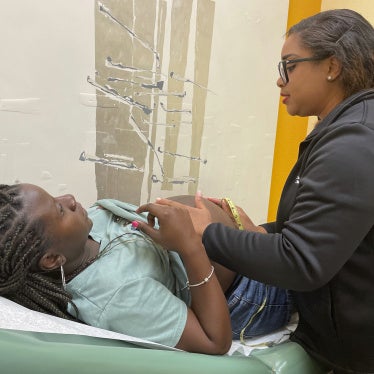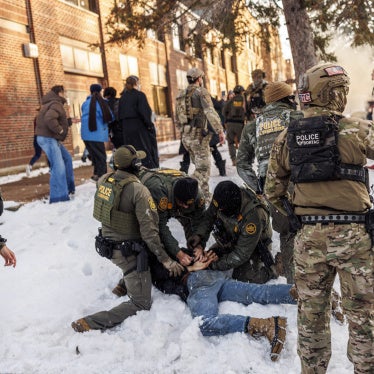In a letter to Philadelphia Mayor John Street Human Rights Watch expressed concern over reports of police ill-treatment of protesters during the Republican National Convention, held at the beginning of August.
These allegations are serious and warrant prompt and thorough investigation. We urge you to conduct a full-scale inquiry without delay. The Philadelphia authorities have an obligation to ensure that police officers and other city personnel who have used excessive force or otherwise violated individuals' rights are held fully accountable and prosecuted or disciplined.
Human Rights Watch recognizes the responsibility of the police to uphold law and order, and in no way condones violence by protesters. Those who assault police officers or others should be prosecuted appropriately. Unlawful actions by some protesters, however, cannot justify excessive use of force by police officers when carrying out arrests or inhumane or brutal treatment of those held in detention.
Many appear to have been arrested and detained without cause, simply because they were taking a photograph, walking near a demonstration site or working as legal observers or as medics attending to injured protesters. Detainees stated that they were denied telephone calls, with some not allowed to make even one call while detained for several days. Others claim they requested but were denied medical treatment while in jail and that they were not provided with medication they required.
The following are among cases of concern to Human Rights Watch, and are examples of the types of complaints reported by many protesters:
On the afternoon of August 1, some thirty protesters, all handcuffed, were held for approximately seven hours in a bus although it was poorly ventilated and temperatures outside were high. According to several sources, those detained in the bus were not provided with water for some hours, despite their protests, and then were given only a small amount. As the bus became overheated, several of the detainees became faint. One, a heavy-set man nicknamed Slim, slumped in his seat and appeared to have fainted. Others called for him to receive medical attention, and he was roughly dragged from the bus, hitting his body on the seats and other items. He was placed on the ground outside, lying on his still handcuffed wrists. The other detainees continued to be held in the bus for several hours more, during which they received only a small amount of water.
Several instances of alleged police brutality were reported. For example, one of the legal observers was allegedly attacked by police officers on August 2 when he tried to photograph an arrest. He states that he was pushed into a brick wall and had his face pushed against the pavement by officers. As a result, he sustained facial injuries and was taken to a hospital hours later. There, his wounds were bandaged and he received a prescription, but the accompanying police officers did not fill the prescription and the man went without medication.
In another case, a man who was videotaping bicycle officers in a staging area at 1200 Race Street at about 1pm on August 2, was allegedly assaulted by two or three officers who ran at him, knocked the camera from his hand, and banged his head into a cement ledge and concrete curb. Other officers yelled to those apprehending the man to smash the camera, which they did. While he was on the ground and handcuffed, he alleges that police first sprayed him with pepper spray and then one officer sprayed water into his nose and mouth, presumably to offset the spray's effect. Another officer then approached and reportedly said "get him with this, we all just pissed in it." The man could not smell or taste anything because of the effects of the spray, but the liquid was warm and could have been urine. He was taunted verbally and repeatedly called a "pussy." He was taken to the 23rd District stationhouse, where he asked to see a doctor because his head had been injured by officers during his arrest, but he was not given treatment.
Many complainants cite overly harsh treatment at the Roundhouse and at the 23rd District holding area and accuse police and facility personnel of dragging detained protesters along the floor, bumping them into walls, and threatening them. Some were forced into contorted positions by being handcuffed from one wrist to the opposite ankle, and those who complained that their or others' handcuffs were too tight and painfully cutting off circulation were sometimes singled out for rough treatment and threats. Several were held for days without being allowed to make a telephone call, medications and treatment were denied to those who had been injured or required them for other ailments, and some single cells were used to hold as many as eight detainees.
One detainee who was held at the Roundhouse reported seeing a naked male protester there being dragged by the neck and hair on August 3, banged against a wall, having his throat trodden upon by a plainclothes officer; the same naked male reportedly had his penis pulled by a female officer. Another demonstrator, who was held for four nights at the Roundhouse, reported that between six and ten guards entered the cells around midnight and again before dawn to remove detainees who were refusing to cooperate with the authorities by withholding their names. These, they proceeded to kick, beat and push into walls in full view of the other detainees, apparently in order to intimidate them.
While many disputes relating to police tactics will no doubt be pursued through the judicial system, we note that city officials have not provided any adequate explanation as to why alleged protest organizers were arrested while simply walking in the street or speaking into cell phones or for the arrests of those at the Haverford and 41st Street warehouse. The latter, we are informed, were engaged in making puppets and other protest art inside the building and yet some were charged with "blocking a highway". What, we wonder, was the legal justification for the raid on the warehouse, and why did the police consider it necessary to arrest all those present?
We believe that these, and other, allegations of brutality and excessively harsh treatment, including the excessive bail amounts set for many of those arrested, send a chilling message to those who wish to express their views and exercise their right to free speech.
We urge you to investigate all allegations of excessive force promptly and fairly, and to hold those officers responsible accountable. We urge you to treat those who remain in custody humanely and to ensure that excessive force is not used against them. We also urge the Police Advisory Commission to review individual cases of alleged abuse and to examine the police policies and practices surrounding actions against these protesters.
We look forward to your reply.
Sincerely,
/s/
Allyson Collins
Washington Associate Director








